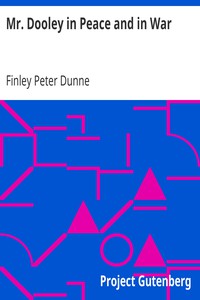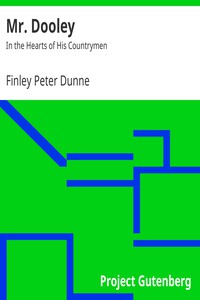Mr. Dooley's Philosophy, Finley Peter Dunne [world best books to read .TXT] 📗

- Author: Finley Peter Dunne
Book online «Mr. Dooley's Philosophy, Finley Peter Dunne [world best books to read .TXT] 📗». Author Finley Peter Dunne
“It's vanity that makes arnychists, Hinnissy—vanity an' th' habits kings has nowadays iv bein' as common as life insurance agents.”
“I don't like kings,” said Mr. Hennessy, “but I like arnychists less. They ought to be kilt off as fast as they're caught.”
“They'll be that,” said Mr. Dooley. “But killin' thim is like wringin' th' neck iv a mickrobe.”
ANGLO-AMERICAN SPORTS
“Hinnissy, if iver we have war with what me frind Carl Schurz'd call th' Mother County, it'll not come fr'm anny Vinnyzwalan question. Ye can't get me excited over th' throbbin' debate on th' location iv th' Orynocoo River or whether th' miners that go to Alaska f'r goold ar're buried be th' Canajeen or th' American authorities. Ye bet ye can't. But some day we'll be beat in a yacht r-race or done up at futball an' thin what Hogan call th' dogs iv war'll break out iv th' kennel an' divastate th' wurruld.”
“Well,” said Mr. Hennessy, complacently, “if we wait f'r that we might as well disband our navy.”
“I dinnaw about that,” said Mr. Dooley, “I dinnaw abut that; afther ye left to investigate th' ir'n foundhries an' other pitcheresque roons iv this misguided counthry, I wint out to give a few raw rahs f'r me fellow colleejens, who was attimptin' to dimonsthrate their supeeryority over th' effete scholars iv England at what I see be th' pa-apers is called th' Olympian games. Ye get to th' Olympian games be suffocation in a tunnel. Whin ye come to, ye pay four shillin's or a dollar in our degraded currency, an' stand in th' sun an' look at th' Prince iv Wales. Th' Prince iv Wales looks at ye, too, but he don't see ye.”
“Me frind, th' American ambassadure was there, an' manny iv th' seats iv larnin' in th' gran' stand was occupied be th' flower iv our seminaries iv meditation or thought conservatories. I r-read it in th' pa-apers. At th' time I come in they was recitin' a pome fr'm th' Greek, to a thoughtful-lookin' young profissor wearin' th' star-spangled banner f'r a necktie an' smokin' a cigareet. 'Now, boys,' says th' profissor, 'all together.' 'Rickety, co-ex, co-ex, hullabaloo, bozoo, bozoo, Harvard,' says th' lads. I was that proud iv me belovid counthry that I wanted to take off me hat there an' thin an' give th' colledge yell iv th' Ar-rchey road reform school. But I was resthrained be a frind iv mine that I met comin' over. He was fr'm Matsachoosetts, an' says he: 'Don't make a disturbance,' he says. 'We've got to create a fav'rable impression here,' he says, 'Th' English,' he says, 'niver shows enthusyasm,' he says. 'Tis regarded as unpolite,' he says. 'If ye yell,' he says, 'they'll think we want to win,' he says, 'an' we didn't come over here to win,' he says. 'Let us show thim,' he says, 'that we're gintlemen, be it iver so painful,' he says. An' I resthrained mesilf be puttin' me fist in me mouth.”
{Illustration}
“They was an Englishman standin' behind me, Hinnissy, an' he was a model iv behaviour f'r all Americans intindin' to take up their homes in Cubia. Ye cudden't get this la-ad war-rmed up if ye built a fire undher him. He had an eye-glass pinned to his face an' he niver even smiled whin a young gintleman fr'm Harvard threw a sledge hammer wan mile, two inches. A fine la-ad, that Harvard man, but if throwin' th' hammer's spoort, thin th' rowlin' mills is th' athletic cintre iv our belovid counthry. Whin an Englishman jumped further thin another la-ad, me frind th' Ice-box, says he: 'H'yah, h'yah!' So whin an American la-ad lept up in th' air as though he'd been caught be th' anchor iv a baloon, I says: 'H'yah, h'yah!' too. Whin a sign iv th' effete aristocracy iv England done up sivral free-bor-rn Americans fr'm Boston in a fut r-race, me frind the Farthest North, he grabs his wan glass eye an' says he: 'Well r-run, Cambridge!' he says; 'Well r-run,' he says. An' 'Well r-run, whativer colledge ye're fr'm,' says I, whin wan iv our la-ads jumped over a fence ahead iv some eager but consarvative English scholars.”
“Well, like a good game, it come three an' three. Three times had victhry perched upon our banner an' thrice—I see it in th' pa-aper—had th' flag iv th' mother counthry proclaimed that Englishmen can r-run. It was thryin' on me narves an' I wanted to yell whin th' tie was r-run off but th' man fr'm Matsachoosetts says: 'Contain ye'ersilf,' he says. 'Don't allow ye'er frinzied American spirit to get away with ye'er manners,' he says. 'Obsarve.' he says, 'th' ca'm with which our brother Anglo-Saxon views th' scene,' he says. 'Ah!' he says, 'they're off an' be th' jumpin' George Wash'nton, I bet ye that fellow fr'm West Newton'll make that red-headed, long-legged, bread-ballasted Englishman look like thirty cints. 'Hurroo,' he says. 'Go on, Harvard,' he says. 'Go on,' he says. 'Rah, rah, rah,' he says. 'Ate him up, chew him up,' he says. 'Harvard!' he says.”
“I looked ar-round at th' ca'm dispassyonate Englishman. He dhropped his eye-glass so he cud see th' race an' he had his cane in th' air. 'Well r-run,' he says. 'Well r-run, Cambridge,' he says. 'Pull him down,' he says. 'Run over him,' he says. 'Thrip him up,' he says. 'They can't r-run,' he says, 'except whin they're Ph'lipinos behind thim,' he says. 'Well r-run,' he says, an' he welted th' man fr'm Matsachoosetts with his cane. 'Be careful what ye're doin' there,' says th' Anglo-Saxon. 'If it wasn't f'r th' 'liance I'd punch ye'er head off,' he says. 'An',' says th' ca'm Englishman, 'if it wasn't f'r our common hurtage,' he says, 'I'd make ye jump over th' gran' stand,' he says. 'Th' English always cud beat us r-runnin',' says the sage iv Matsachoosetts. 'Th' Americans start first an' finishes last,' says th' Englishman. An' I had to pull thim apart.”
“Whether it is that our American colleejans spinds too much iv their lung power in provin' their devotion to what Hogan calls their Almy Matthers or not, I dinnaw, but annyhow, we had to dhrag th' riprisintative iv our branch iv th' Anglo-Saxon an' Boheemyan civilization in th' three-mile race fr'm undher two thousand iv our cousins or brothers-in-law that was ca'mly an' soberly, but hurridly an' noisily chargin' acrost th' thrack to cheer their own man.”
“Me frind fr'm Matsachoosets was blue as we winded our way to th' sthrangulation railway an' started back f'r home. 'I'm sorry,' he says, 'to lose me timper,' he says, 'but,' he says, 'afther all th' pretinded affection iv these people f'r us,' he says, 'an' afther all we've done f'r thim in Alaska an'—an' ivrywhere,' he says, 'an' thim sellin' us coal whin they might've sold it to th' Spanyards if th' Spanyards'd had th' money,' he says, 'to see th' conduct iv that coarse an' brutal Englishman—' 'Th' wan that won th' r-race?' says I. 'Yes,' he says. 'No, I mean th' wan that lammed me with his cane,' he says. 'If it hadn't been,' he says, 'that we're united,' he says, 'be a common pathrimony,' he says, 'I'd've had his life,' he





Comments (0)